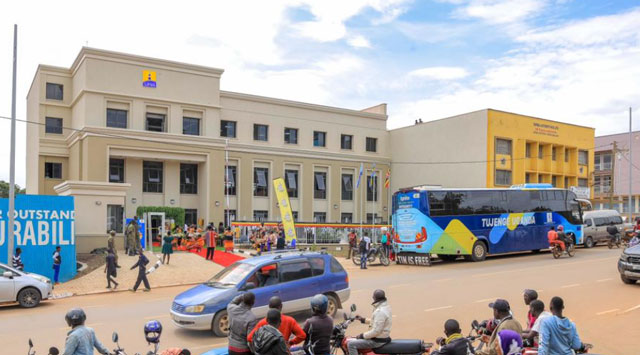
Masaka, Uganda | THE INDEPENDENT | The Uganda Revenue Authority (URA) has moved to revamp the national taxpayers’ ledger management system in a bid to improve efficiency and levels of compliance in tax collection.
The innovation was revealed by the URA Commissioner General John Musinguzi Rujoki, at the commissioning of their South-Western Regional Offices for Customs and Domestic Taxes, which was built at shillings 9.78 billion in Masaka City.
According to Musunguzi, the new digitalized system enables taxpayers to track with ease their tax payment records, and their outstanding tax obligations, make timely declarations and filing returns, and a simplified process for computing Value Added Tax-VAT, without physically interfacing with the URA staff.
He says that apart from improving transparency in revenue collection and management process, the new system has come in to address the challenge of over-assessment of taxpayers, which has also been contributing to tax evasion and compliance.
“This is a simplified taxpayer ledger summarizing a taxpayer’s transactions and tax balances for each tax type and tax period. The ledger specifies the principal tax, penal tax, interest, and outstanding balance, if any,” he indicates.
Musinguzi explains that their staff across the country have been instructed to begin training their clients on how to navigate the new system, such that it can be effectively rolled out.
Musinguzi is optimistic that the new reforms will be a great milestone toward expanding the country’s tax collection performances, which has been witnessed by the growth of the taxpayers’ register.
According to him, preliminary figures from this financial year’s first-quarter performance; (July to September) indicate a significant improvement in revenue collection of shillings 6.015 trillion, representing 11.3 percent growth, unlike the previous financial year’s first quarter which was shillings 607.47 billion shortfall.
He indicates that the authority is working around the clock to ensure that they roll out the necessary innovations in the form of technology and physical infrastructure that can help bring the taxpayers closer, as a way of improving their levels of compliance and voluntary declaration of returns.
Sarah Chelangat, the URA Commissioner for Domestic Taxes challenged the political leadership to support in mobilizing domestic business growth, as well as encouraging citizens to embrace the digitalized systems.
She adds that the authority is committed to rolling out a wider range of innovations aimed at improving its customer relations.
The Leader of Opposition in Parliament also Member of Parliament for Nyendo-Mukungwe Division Mathias Mpuuga Nsamba called upon the tax collection body to desist from measures that are too repressive to the ordinary taxpayers at the expense of bigger habitual defaulters.
He challenged the URA Commissioner General to develop a framework of continuously reaching out to every sector and its players to ensure that everyone appreciates their civic responsibilities of paying taxes rather than concentrating on a small size of the wider eligible tax base.
The State Minister for Microfinance Haruna Kyeyune Kasolo, challenged the tax body to demystify the different tax policies and their calculations to make them clearer to the ordinary Ugandans, something he says will also improve the levels of compliance.
“We need to have these terms and taxes explained in the different local languages, such that our people can clearly understand what they are paying,” he noted.
****
URN
 The Independent Uganda: You get the Truth we Pay the Price
The Independent Uganda: You get the Truth we Pay the Price





